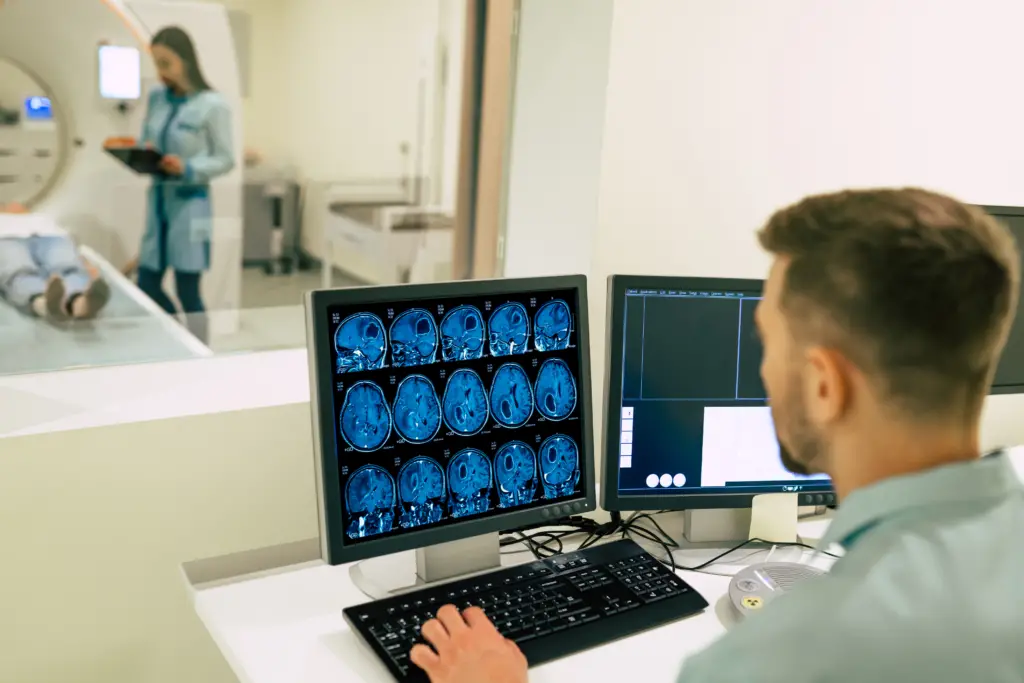Discover how long does a ct scan take, factors affecting their length, and what to expect during your appointment in our comprehensive guide.
Computed Tomography (CT) scans are pivotal in modern healthcare, providing a non-invasive means to inspect the internal structures of the body. They have come a long way since their inception, with continuous technological advancements making them quicker and more efficient.
What is a CT Scan?
A CT scan is a medical imaging procedure that utilizes X-rays to capture images of the inside of the body. It provides detailed images of bones, blood vessels, and soft tissues, aiding in the diagnosis and monitoring of medical conditions. CT Scans play a critical role in the early detection and treatment of diseases like cancer.
They are also instrumental in trauma care, where timely diagnosis can be life-saving. Over the years, CT scanning technology has undergone significant enhancements, reducing the scanning time while improving image quality.
The Process of Getting a CT Scan
The journey from appointment scheduling to receiving the results comprises several steps, each crucial for ensuring accurate diagnosis.
Before the scan, patients may need to follow certain dietary restrictions and wear appropriate clothing to ensure the accuracy of the images. The scanning process itself is relatively quick, but the duration can vary based on the area being scanned and the specifics of the equipment used. After the scan, patients may need to wait for the radiologist to review the images to ensure no further imaging is needed.
How Long Does a CT Scan Take?
The duration of a CT scan is a crucial aspect that most patients are keen on understanding before they undergo the procedure. It’s not just about the time; the duration also indirectly hints at the complexity of the procedure, the extent of exposure to radiation, and the waiting period for the results.
The time it takes for a CT scan can vary significantly based on a multitude of factors, making it a common concern among patients. This variance in time can also impact the scheduling and overall experience of the medical imaging process.
Factors Affecting the Duration
There are several factors that play a critical role in determining how long a CT scan will take. Understanding these factors can help set realistic expectations and provide a clearer picture of what the process entails.
Type of CT Scan:
The type of CT scan being performed is a significant factor that affects the duration. For instance, a standard CT scan will take less time as compared to a specialized CT scan such as a CT angiography or a CT colonography which may take longer due to the additional preparations and procedures involved.
Area Being Scanned:
The specific area of the body being scanned also influences the time it takes. Scanning smaller regions like the head or neck is generally quicker than scanning larger or more complex areas like the chest, abdomen, or pelvis.
Technology Used:
The technology and equipment used can significantly impact the duration of the CT scan. Modern CT scanners are faster and more efficient, capable of completing scans in a fraction of the time it used to take with older models.
Preparation Time:
Preparation for a CT scan can also add to the time. This includes the time it takes to change into appropriate clothing, the administration of contrast material if needed, and positioning the patient correctly on the scanning table.
Number of Images:
The number of images or slices needed will also influence the duration. More images mean more time, but also more detailed information for diagnosis.
Average Duration of Common CT Scans
The actual scanning process can be quite swift, but the overall time spent in the scanning room could be longer due to the preparation and post-scan processes. Typically, CT scans can take anywhere from a few minutes to half an hour.
For instance:
- A head CT may take around 10 minutes.
- A chest or abdomen CT may take approximately 15 to 30 minutes due to the larger area being scanned and the potential need for different angles or positions.
Patient’s Experience
The patient’s experience of the duration can also be significantly affected by individual factors. The psychological and physical state of the patient can influence the perception of time spent during the scan.
Comfort Level:
Some individuals may find the process uncomfortable, especially if they are claustrophobic or uneasy about medical procedures. The discomfort can make the time seem to drag on.
Anxiety:
It is a common feeling among patients undergoing a CT scan, especially if they are awaiting diagnosis for severe health conditions.
Communication:
Effective communication from the medical staff about what to expect can significantly enhance the patient’s experience. Knowing the estimated duration, what’s happening during each phase, and being reassured throughout the process. It can make the time pass more comfortably.

FAQs
What are the side effects of a CT Scan?
Though CT scans are generally safe, some individuals may experience allergic reactions to contrast materials, and there’s a minimal risk of radiation exposure.
Can I eat before a CT Scan?
It depends on the type of CT scan. Some may require fasting, while others do not.
Conclusion
The duration of a CT scan is influenced by a myriad of factors ranging from the type of scan, the technology used, the area being scanned, and the patient’s own comfort and anxiety levels. While the actual scanning time might be quick, the overall experience might feel longer due to preparations and the emotional state of the patient. Understanding these factors and having clear communication with the healthcare provider can help manage expectations and make the CT scan experience as comfortable as possible.
